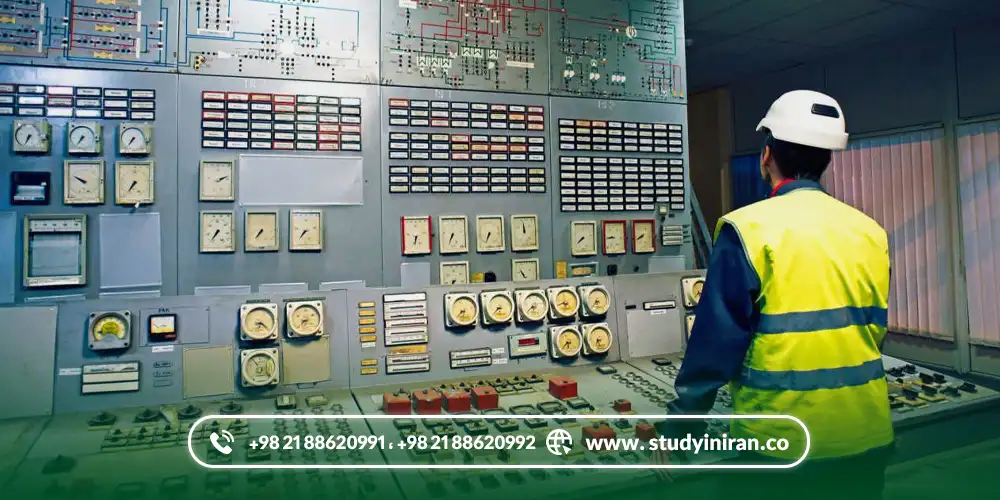- Why Study Electrical Engineering in Iran?
- Electrical Engineering Specializations in Iran
- Research in Electrical Engineering
- Postgraduate Electrical Engineering Programs in Iran
- Top Universities for Electrical Engineering in Iran
- Admission Requirements for Electrical Engineering in Iran
- Electrical Engineering Scholarships in Iran
- Final Word
- FAQs
Electrical engineering is a core discipline that powers much of today’s technology, from power grids and renewable energy systems to advanced electronics and telecommunications. In Iran, students in this field gain both a strong academic background and practical skills that align with industry needs.
Top institutions like the University of Tehran, Sharif University of Technology, Amirkabir University of Technology, and Iran University of Science and Technology run programs that balance theory, lab work, and project-based learning. This approach helps students move beyond textbooks and apply their knowledge in real-world scenarios.
Iran is also an affordable destination for higher education, with tuition and living costs well below many other countries. Graduates can pursue careers in sectors such as energy, power systems, telecommunications, automation, and emerging tech — both within Iran and abroad.
If you’re aiming for a career built on innovation and problem-solving, electrical engineering in Iran offers the resources, training, and opportunities to get you there.
Why Study Electrical Engineering in Iran?
Choosing Iran for an electrical engineering degree offers a mix of strong academics, practical training, and affordability — making it an appealing option for both domestic and international students.
Renowned Universities
Iran is home to leading institutions such as the University of Tehran, Sharif University of Technology, Amirkabir University of Technology, and Iran University of Science and Technology. These universities deliver bachelor’s and graduate programs with experienced faculty and modern teaching facilities, ensuring a rigorous and up-to-date education.
Diverse International Community
With over 24,000 international students currently studying in Iran, campuses offer a multicultural environment where students can share perspectives, build global friendships, and experience life in a different cultural setting.

Affordable Tuition and Scholarships
Iran offers more than 72 affordable undergraduate programs, plus over 51 scholarship opportunities for qualified students. These scholarships can significantly reduce costs, making high-quality education accessible without the heavy price tag of many Western countries.
Research-Driven Faculty
Academic programs are supported by faculty who are active researchers in various branches of electrical and computer engineering. Postdoctoral researchers also contribute to advancing studies and expanding research opportunities.
Hands-On Learning and Advanced Labs
Beyond theory, electrical engineering programs in Iran emphasize practical skills. Dozens of well-equipped teaching and research labs allow students to work directly with modern equipment and gain real-world technical experience — often under the guidance of senior faculty.
Electrical Engineering Specializations in Iran
Electrical engineering programs in Iran cover a wide range of specializations, attracting top students from competitive university entrance exams. The main branches include:
- Telecommunications
- Control Systems
- Electronics
- Power Engineering
Research in Electrical Engineering
Iran’s electrical engineering programs combine academic learning with strong research opportunities. Hundreds of master’s and PhD students are actively involved in research projects that advance both theory and practical applications, often in collaboration with industry. Key research areas include:
- Telecommunication systems
- Communication networks
- Electromagnetic fields and waves
- Electronics and power electronics
- Power systems
- Electrical machines and drives
- Control engineering
- Computer architecture
- Computer software engineering
- Artificial intelligence
This diversity in research reflects the field’s role as both a foundation for technological innovation and a bridge between academia and industry.
Postgraduate Electrical Engineering Programs in Iran
Master’s Degree (M.Sc. / M.Eng)
Master’s programs in electrical engineering in Iran usually run for two years. Admission is competitive, with most candidates entering through an entrance exam. However, top-performing undergraduates — typically the top 10% — may be admitted directly.
Ph.D. Degree
Doctoral studies generally take about four years. Entry requires passing an entrance exam and providing a strong research portfolio. Ph.D. candidates work on advanced projects, often as part of research teams led by senior faculty and supported by postdoctoral fellows. These projects cover a wide spectrum of fields and frequently involve collaboration with industry.
Top Universities for Electrical Engineering in Iran

Iran hosts several highly regarded universities offering strong programs in electrical engineering, known for modern curricula, applied research, and advanced laboratory facilities. Many of these institutions also provide scholarships to domestic and international students.
Amirkabir University of Technology (Tehran Polytechnic)
- National subject rank: 82
- National rank: 1283
- Global rank: Top 7% worldwide
One of the oldest and most respected engineering schools in Iran, with a strong reputation in electrical engineering.
Sharif University of Technology
- National subject rank: 276
- National rank: 948
- Global rank: Top 5% worldwide
Recognized as a leading science and technology hub in Iran, consistently achieving high global rankings.
University of Tehran – Kish International Campus
- National subject rank: 374
- National rank: 657
- Global rank: Top 4% worldwide
Offers a strong academic environment for both domestic and international students pursuing electrical engineering.
Shiraz University of Technology
- National subject rank: 392
- National rank: 510
- Global rank: Top 3% worldwide
A prominent southern university known for quality education and research in the field.
Iran University of Science and Technology
- National subject rank: 421
- National rank: 1311
- Global rank: Top 7% worldwide
A key player in Iran’s engineering landscape, with extensive work in electrical engineering and emerging technologies.
Admission Requirements for Electrical Engineering in Iran
To get into an electrical engineering program in Iran, applicants generally need to meet these criteria:
1. Educational Background
A completed high school diploma or equivalent with strong grades in mathematics, physics, and other core sciences.
2. Language Proficiency
For programs taught in Persian: fluency in Farsi is required.
For programs taught in English: proof of English proficiency (IELTS, TOEFL, etc.) is usually needed.
3. Entrance Exam
Most universities require passing an entrance exam covering mathematics, physics, chemistry, and sometimes Persian literature.
4. Statement of Purpose
Some institutions request a written statement explaining the applicant’s interest in electrical engineering, academic goals, and career ambitions.
5. Recommendation Letters
One or more letters from teachers or professors supporting the applicant’s academic ability and motivation.
6. Age Restrictions
Certain universities may set an age limit, often around 23 years.
7. Program-Specific Requirements
Depending on the chosen specialization, additional prerequisites may apply.
Electrical Engineering Scholarships in Iran

Students pursuing electrical engineering in Iran have access to various scholarships and financial aid programs funded by the government, universities, industries, and other organizations. The main types include:
1. National Scholarships
Awarded by government ministries and agencies based on academic merit, financial need, or special circumstances.
2. University Scholarships
Offered by individual universities to top-performing students, covering part or all of the tuition. These may be merit-based or need-based.
3. Research Grants
Provided to students involved in innovative projects or scientific research at universities or research centers.
4. Industry-Funded Scholarships
Sponsored by private companies and industrial organizations to attract and train future talent.
5. Social and Welfare Scholarships
Available for students from low
income families or those with specific personal circumstances, offered by social welfare organizations.
6. Cultural Exchange Scholarships
Given to international students through cultural exchange agreements between Iran and partner countries.
7. Regional Scholarships
Allocated by certain provinces or local governments to support students from their area.
8. Military Scholarships
Offered to students specializing in engineering fields relevant to defense or military sectors.
Final Word
Studying electrical engineering in Iran combines solid academics, practical training, and lower living and tuition costs compared to many other countries. The field’s broad applications in industries like energy, telecommunications, emerging tech, and AI mean graduates have strong career prospects both locally and abroad. Universities offer updated programs, access to modern labs, and experienced faculty, giving students the skills they need for the job market.
For international applicants, Study in Iran provides clear, straightforward details on admissions, tuition, scholarships, and student life, making it easier to plan and start their studies.
FAQs
Typically 4 years (8 semesters), covering theory, lab work, and practical projects.
Core fields include Power, Control, Electronics, and Telecommunications. Some universities also offer specialized tracks like Photonics or Biomedical–Electrical Engineering.
Domestic students take the national entrance exam. International students generally submit a high school diploma, transcripts, proof of language proficiency (Persian or English, depending on the program), and sometimes recommendation letters and a statement of purpose.
For international students, typically between $1,000 and $3,000 per year. Living costs in Iran are also relatively affordable compared to many countries.
Yes. The Iranian government, universities, and even some industries offer scholarships that may cover part or all tuition and living expenses.
Iranian universities rank among the top in the region for electrical engineering, with experienced faculty, modern labs, and international recognition.
Roles in power and energy industries, telecom companies, electronics and control systems, R&D centers, and international engineering projects.
Yes. Graduates can pursue master’s or PhD programs in Iran or abroad in more specialized areas of electrical engineering.






0 Reply To “Studying Electrical Engineering in Iran”